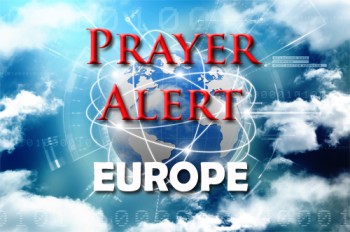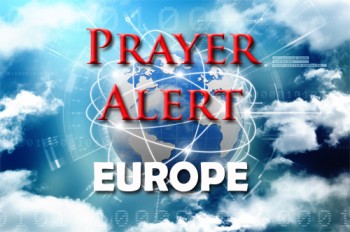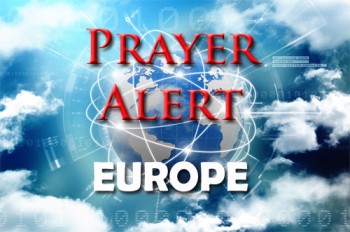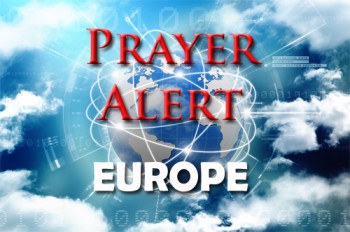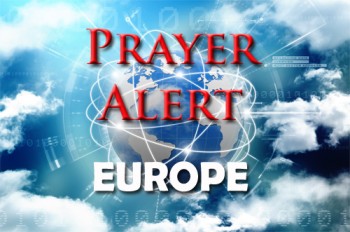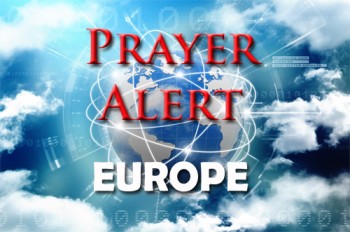Displaying items by tag: Europe
Germany: Holocaust trial
92-year-old Bruno Dey will be tried in Germany for complicity in mass murder of 5,230 people in the Stutthof Nazi death camp during World War Two. The former guard admitted knowledge of atrocities of murder in gas chambers, where over 65,000 died before Stutthof was liberated on 9 May 1945. This trial is likely to be one of the last against a former Nazi guard. Dr Efraim Zuroff who campaigns for the rights of Holocaust survivors, welcomed the decision to bring Mr Dey to trial. ‘The passage of time in no way diminishes the criminal responsibility of those guilty of aiding and abetting the implementation of the Final Solution,’ he said. There have been two more recent trials of Stutthof guards after 20+ survivors of the camp were located, most of whom are currently residing in Israel.
Turkey: Ramps up drilling off Cyprus
The Republic of Cyprus is in the EU, but the self-declared Turkish Republic of Northern Cyprus is recognised only by Turkey, and is internationally isolated. Ankara's latest move to increase drilling for oil off the coast of Cyprus by sending a third ship to the eastern Mediterranean, despite EU warnings, comes on the eve of talks between the president of Cyprus and the Turkish Cypriot leader. At the time of writing, Cyprus president Nicos Anastasiades and Mustafa Akinci are expected to discuss ways of resuming negotiations aimed at reuniting the divided island after talks failed two years ago. In 1974 Cyprus split, 165,000 Greek Cypriots fled or were expelled from the north, and 45,000 Turkish Cypriots from the south took their place. In the years since then there have been failed talks to re-unite the island of Cyprus as Greek- and Turkish-Cypriot communities stand by their right to take their old homes back, or be compensated.
Italy: another charity rescue boat banned
Deputy prime minister Matteo Salvini has banned the Alan Kurdi, carrying forty migrants, from entering Italian waters. The boat, run by a German charity, had hoped to dock at Lampedusa. This rescue mission comes shortly after over one hundred migrants disembarked from a different boat in Sicily, but only after a new deal was reached with the EU to distribute those on board between five nations - Germany, France, Portugal, Luxembourg, and Ireland. A Sea-Eye spokesperson said migrant rescue boats had to respond immediately to situations, as soon as there is an emergency at sea, and political calculations should not play any role whatsoever. It is critical that all migrants be allowed to dock at Lampedusa to receive future treatment. In July authorities arrested the captain of another rescue ship after it docked there without prior permission.
Trying to negotiate no hard UK border with EU
Kevin Meagher, a former special advisor to Northern Ireland’s Labour party, has said that Boris Johnson is trying to ‘look down the barrel of the European Commission to see if there is any wiggle room for him’ as he tries to negotiate a backstop which only applies to Northern Ireland and avoids a hard border between the UK and EU. Let us pray for an answer that only God can bring about. May there be a frictionless open border agreed upon by every British, Irish and European politician.
Arctic Circle: unprecedented wildfires
The Arctic region’s hottest June ever has brought its worst wildfire season on record. Huge blazes in Greenland, Siberia and Alaska are producing plumes of black carbon smoke that can harm humans and other animals by entering the lungs and bloodstream. Wildfires also play a role in global warming as underlying peat catches fire emitting as much CO2 in June as Sweden emits in a year. Russia's forestry agency reported black noxious fumes covering entire cities. The fire areas in Siberia are larger than Massachusetts, as eleven of forty-nine Russian regions burn. Greenland’s blaze came as the vast ice sheet melt started a month early. Alaska stated that 400 fires have been reported. Such fires can last months. Currently blazes are only controlled when they threaten settlements. On 1 August the BBC reported that Russia is sending soldiers to fight Siberia’s 7.4 million acres of fires.
Europe: UnitedHive Testimonies App
WHAT'S UP IN EUROPE? - God is doing extraordinary things through ordinary people like us. We can see that during events and camps or through everyday friendships, the Body of Christ in Europe is alive! UnitedHive is an app where you can find testimonies of what God is doing in Europe and in your region. Check it out HERE, it’s a fun way to share and read about lives being changed.
EU: free ports and money-laundering
The European Commission has said that free ports, the Singapore-style tax-free zones favoured by Boris Johnson, are ‘potentially vulnerable to money-laundering and financing terrorism’ in the European single market. Free ports are ‘the new emerging threat’, said the European justice commissioner, Věra Jourová. ‘This is something we want to focus on more.’ Prime Minister Johnson says he wants ‘about six’ tax-free zones in ports as part of his vision for the UK after Brexit. He has yet to give details on their size and location. EU countries and their dependencies already shelter 80+ free ports, including one on the Isle of Man, a British crown dependency which is neither in the EU nor the UK. The commission’s report warned that the EU has ‘a structural problem’ in preventing the financial system from being used by criminals.
France: frosty welcome for Greta
Teen climate activist Greta Thunberg delivered an address to lawmakers at France’s national assembly. But some right-wing MPs chose to stay away, saying that to fight climate change ‘we need scientific progress and political courage, not apocalyptic gurus’, and ‘Don't count on me to applaud a prophetess in shorts, a Nobel Prize for Fear.’ Greta noted that some lawmakers had not attended and said, ‘That's fine. We are, after all, just children. You don't have to listen to us. But you do have to listen to the scientists, unite behind the science.’ On 25 July, she released a music track calling for civil disobedience while ambient instrumentals provided background music that would appeal to teens. See
European Commission President
Europe’s new president of the European Commission is German Defence Minister Ursula von der Leyen. She will lead the executive body that shapes policy for the world's largest economic bloc. Many believe Leyen's appointment confirms their view that the EU is undemocratic and doesn't respect ordinary citizens because she wasn't selected by the voters in the recent EU elections or by the lawmakers who won those seats. She was hand-picked by the 28 EU member states, who side-stepped better-known candidates chosen by various political factions. Anti-EU politicians like France's Marine Le Pen will spend the next five years declaring that von der Leyen's presidency reflects everything that is wrong with Brussels. Angela Merkel, Emmanuel Macron and others gave her narrow margin of approval so that her mandate is weak as she confronts fraught relations with the US and China, showdowns over Italy's budget, erosion of Hungary and Poland’s rule of law and the UK's exit.
Sweden: Skin microchips replace cash
Over 4,000 Swedish people have futuristic microchips implanted into their skin to replace credit cards and cash, as Sweden moves toward a cashless society. Only 1% of their economy is notes and coins. At the same time there’s been a dramatic decrease in crime - with only two bank robberies last year compared to 110 in 2008. The chips are inserted into their hands and pioneers predict millions will soon join them as they hope to take it global. The chips, the size of a grain of rice, can monitor their health and even replace key-cards to allow them to enter offices and buildings. The microchips were pioneered by a former body piercer who has hopeful international investors. He said the technology is safe but many fear cybercrime, integration with other systems and illegal data sharing. Users say they’re happy to give up privacy for convenience.


